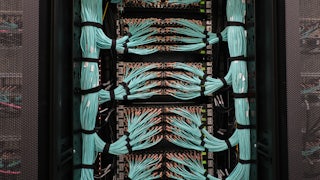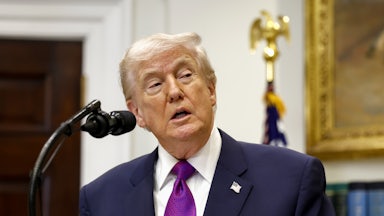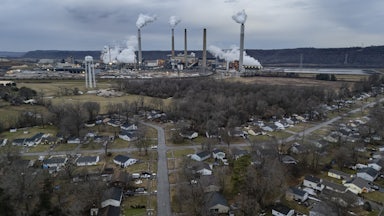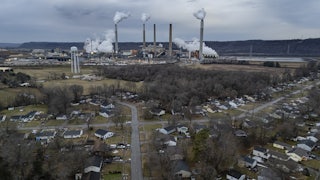Donald Trump wants to save the coal industry. Earlier this week, he signed a rash of executive orders to reopen shuttered coal plants, subsidize unprofitable ones, and—through legally dubious means—tear up regulations that “discriminate” against coal at every level of government, all the while opening up millions of acres of public lands for coal mining. The order further instructs the Department of Energy to explore the question of whether coal-fired power plants could provide energy to new AI data centers. That suite of orders builds on an announcement from the Department of Energy last week that it had identified 16 federal sites that are “uniquely positioned for rapid data center construction, including in-place energy infrastructure.”
“You know, we need to do the AI, all of this new technology that’s coming on line,” Trump said on Tuesday, flanked by coal miners. “We need more than double the energy, the electricity, that we currently have.”
Experts are skeptical that Trump will revive King Coal, however much energy AI developers say they need. Coal currently accounts for about 16 percent of electricity generation in the United States, down from more than 40 percent in 2011. Half of the country’s remaining fleet of coal-fired power plants are scheduled to be retired through 2030. Given that coal is now significantly more expensive than other sources, companies and investors aren’t especially eager to pour billions of dollars into plants that typically operate for 40 to 60 years. Researchers at the Institute for Energy Economics and Financial Analysis, or IEEFA, expect that all of the country’s remaining coal plants could close by 2040. That’s good news for the people who may now be spared the effects of coal pollution, which are estimated to have killed around half a million people, in one study of Medicare records, between 1999 and 2020.
But a striking number of congressional Democrats seem to agree with Trump on the importance of pouring limitless amounts of energy into AI in service of a vaguely worded set of national security priorities. During a House Energy and Commerce Committee hearing on Wednesday—featuring former Google and Alphabet chief Eric Schmidt—Democrats adopted an odd position: It is imperative that the U.S. do whatever it takes to beat China in the race for AI dominance, and Donald Trump is making that harder. “Instead of winning the future,” ranking Democrat Frank Pallone said in his opening statement, “Trump’s economic turmoil could send America’s tech leadership into a tailspin.” While noting the need for safeguards around privacy and energy bills, several Democrats praised Schmidt’s call for energy build-outs for AI. Schmidt’s opening statement contended that the “technological revolution and the prosperity” AI promises “depend entirely on a modern, resilient, and vastly expanded energy infrastructure.” He also argued that the “future of computation” could require “potentially 100x more energy.” He put it more bluntly later on in the hearing: “Let everybody build everything. We need it all now.”
Colorado Democrat Diana Degette affirmed that, “We’re going to need a large increase in all types of energy to not just deal with current demands of consumers but AI.” So long as the White House continues to undermine due process, deport academics, and defund federal research, Jake Auchincloss asked, “can America beat China on AI?” Alexandria Ocasio-Cortez was a lonely voice in raising concerns about the planet-heating greenhouse gas emissions that would result from bringing so much new fossil fuel capacity online.
Schmidt didn’t offer many specifics in attempting to describe why rapidly multiplying energy supply by 100 would be anything other than sum-negative for the planet. “The needs of our industry are so great that we cannot cut down any of the sources of energy right now,” he said. “The intelligence revolution—the ability to do planning and discovery—will allow us as Americans to develop new materials, new energy sources, and so forth because of the AI data centers. Our core argument is: Invest in the way we can now because the future will be so much cleaner and more efficient as a result of these algorithms.”
That’s gobbledygook, and in keeping with the kind of nonsense AI enthusiasts tend to spout whenever asked about why their products demand a new “social contract” and hundreds of nuclear power plants’ worth of energy. Democrats are right to raise concerns about privacy and energy affordability, but they should be asking more fundamental questions: What, concretely, will all this AI actually do? Does that justify the fantastical amounts of electricity its boosters say is needed? And if AI is so essential to U.S. economic prosperity, then why is the industry so bad at making money?
Writers such as Ed Zitron, Edward Ongweso Jr., Max Read, and other AI critics have diligently chronicled reasons for skepticism on all of these fronts, easily accessible to any congressional staffers looking to inform or feed questions to their members. As to whether AI really needs this much energy, it’s worth noting that Schmidt gave his testimony as Microsoft announced it was “slowing or pausing” a portion of its planned data construction, including a $1 billion project in Ohio. There’s nothing inevitable about all that demand Schmidt and others say is coming, and plenty of cracks starting to show. Companies are trying to build an aura of inevitability around the scary and/or exciting prospect of “artificial general intelligence,” which—depending on who you talk to about it—can refer either to a godlike supercomputer or a replacement for low- and mid-level white-collar jobs. Whatever AGI is, and whenever it “happens,” they argue, the U.S. should beat China to it; besting China, of course—and averting some ill-defined calamity—will require generous support from the U.S. government in the form of cheap land, regulatory relief, and more. “The risk” of China outpacing the U.S. on AI, Schmidt warned in his opening statement, “includes not only competition but also potential I.P. theft or modification of systems and the possibility of China achieving a monopoly leadership position or initiating preparatory attacks.”
The marriage of nineteenth-century technology (coal) with one whose adherents describe it in futuristic, quasi-religious terms (AI) is fitting for an administration defined by another unholy alliance: between longtime Republican revanchists in the fossil fuel industry and sci-fi-obsessed Silicon Valley man-children, lots of whom supported Democrats until realizing it was more lucrative to back their opponents. The tech oligarchs’ pivot over the last year to talking about AI and the energy it requires as vital to U.S. national security can be understood in similar terms: as a moneymaking opportunity. Democrats who are happy to say Trump’s wrong about so many other things shouldn’t parrot his talking points on AI just because a few CEOs said the word “China.”








